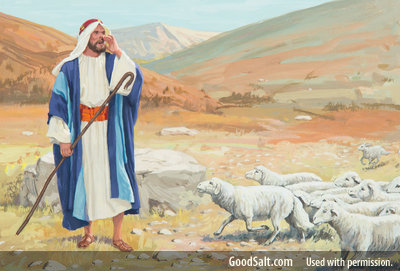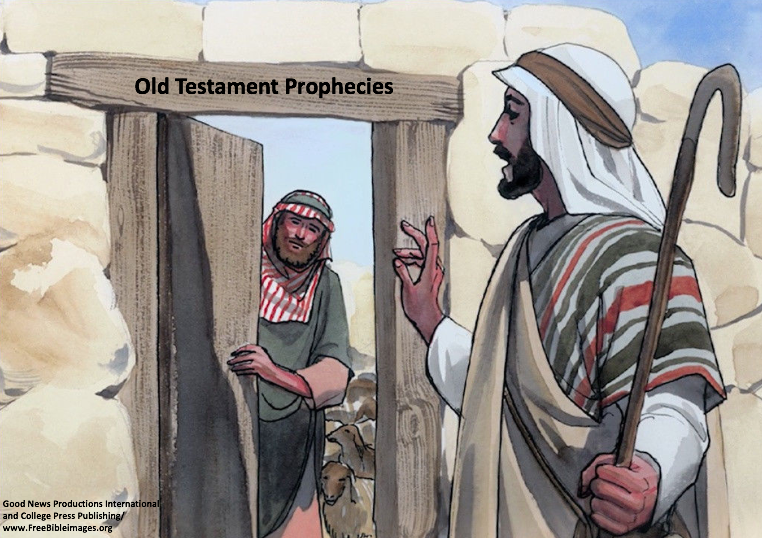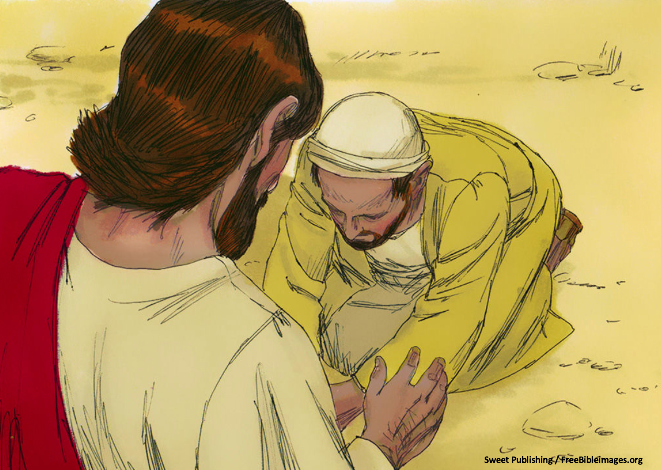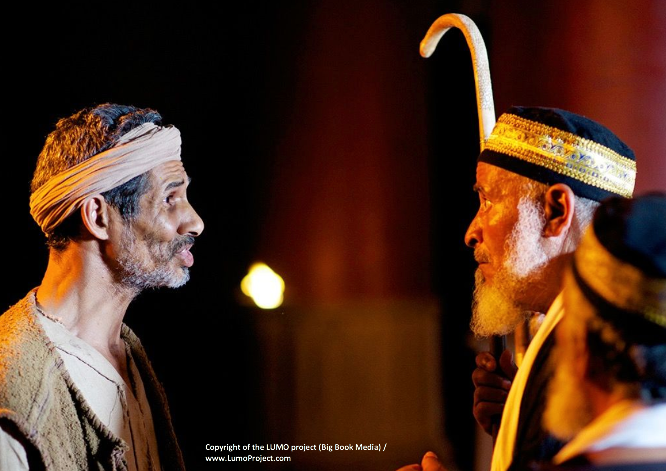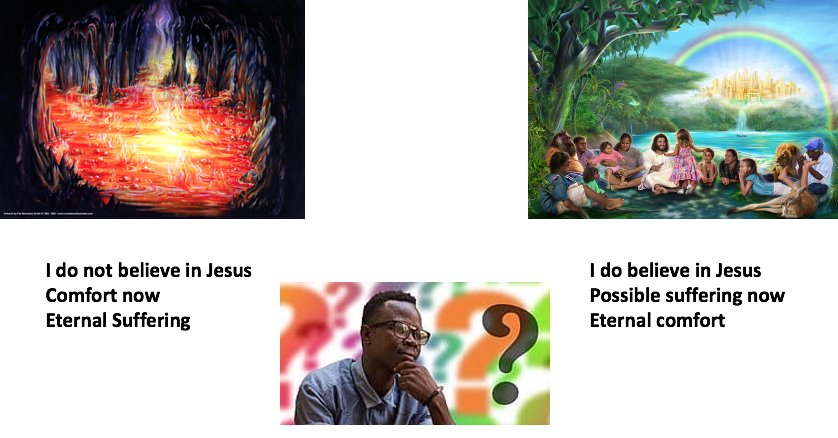“I am the good shepherd. The good shepherd gives His life for the sheep.” John 10:11
Pharisaism replaces rest in Jesus with demands for spiritual performance. People under a Pharisaic system can develop a distorted image of God. In John 10:11-21, we will discover that our Good Shepherd, Jesus Christ, is on our side and not against us.
We saw in John 10:1-10 that we can trust Jesus as the true Shepherd because of …
– His prophetic credentials (John 10:1-2)
– The doorkeeper’s (John the Baptist) confirmation (John 10:3a)
– His personal concern for each of us (John 10:3b)
– His competent leadership (John 10:3c-6)
– His completely free offer of salvation (John 10:7-9a, 10b)
– His constant provision of nourishment (John 10:9b, 10c).
The Pharisees had not entered the sheepfold in the prescribed manner, that is, through faith in God’s Promised-Messiah, Jesus Christ. The Messiah and God’s provision of salvation through Him was a gracious gift not to be earned through compliance with the Law. Because of their unbelief, the Pharisees were false shepherds who misled their followers onto a treacherous path of dependency upon their own efforts to save themselves. Since they led the sheep along the wrong path away from the life Jesus offered, Jesus called them thieves and robbers of God’s sheep.
Being under a Pharisaic system can hinder believers from growing closer to the True Shepherd. The next few days, Lord willing, we will learn how to grow closer to the Good Shepherd, Jesus Christ, when we realize who He truly is. Those under a Pharisaic system may have a distorted view of Christ which keeps them from growing closer to Him. The remedy? Discover the truth about Jesus. He is a good, trustworthy Shepherd. I can grow closer to the Good Shepherd when I…
REALIZE HIS SACRIFICIAL INTEREST IN ME (10:11-13). Beginning in verse 11, there is a stark contrast between the Good Shepherd and the thief. Jesus identifies Himself as the Good Shepherd when He said, “I am the good shepherd. The good shepherd gives His life for the sheep.” (John 10:11). This is another “I AM” statement by which Jesus claims to be the same God Who spoke to Moses in Exodus 3:14.
Notice that Jesus is not a mere shepherd, but “the good shepherd.” What does “the good shepherd” do? He “gives His life for the sheep” so the sheep might live, but the thief comes to kill the sheep so he might live (John 10:10a). False shepherds come to take from others, but the Good Shepherd comes to give His life for the sheep. Jesus has the best interest of the sheep in mind. He laid down His life so that those who believe in Him may have eternal life (John 3:14-15). The word “for” in John 10:11 refers to the substitutionary death of Christ. Christ died “for” us or “instead” of us. He died in our place so we may live.
The Bible is clear that “all have sinned and fall short of the glory of God” (Romans 3:23). Since God is a holy God, He must punish sin. God says that “the wages of sin is death” (Romans 6:23). The word “death” here refers to eternal separation from God. All people deserve to die forever in the Lake of fire (Revelation 20:15).
God could have permitted us to take our own punishment. But instead, 2,000 years ago, God’s perfect Son took our place on the cross and died as our Substitute. The Bible tells us, “But God demonstrates His own love toward us, in that while we were still sinners, Christ died for us” (Romans 5:8).
A California newspaper reported that a man fired a gun into a pedestrian-filled sidewalk. To shield a three-year-old boy from the hail of bullets, a twenty-nine-year-old apartment manager grabbed him and ran back into the building. Carrying the boy, he ran up a flight of stairs before collapsing from two bullet wounds in his chest. A policeman observed, “He brought the boy out of the line of fire and died because of it.” 1
As our Good Shepherd, Jesus Christ took what caused our death, our sin, and died for us before coming back to life three days later. By dying in our place, Jesus satisfied God’s holy demand to punish our sins. Jesus is alive today and He has the power to save us from hell and give us eternal life. Jesus is the one and only “door” (John 10:9) for the sheep. He is the only One
Who paid the penalty for our sin when He died in our place on the cross and rose from the dead. There is no other way to get to heaven (John 14:6) except to believe in Jesus alone for His gift of eternal life (John 3:15; 6:68-69; Acts 4:12).
Have you ever come to the point where you accepted Jesus’ death on your behalf? If not, would you like to now? Simply take Christ at His Word when He said, “Whoever believes in Him should not perish but have everlasting life” (John 3:16). The moment you believe or trust in Jesus alone, He gives you eternal life which can never be lost or taken away from you.
Jesus is contrasted with the hireling who does not share the concern of the shepherd for the sheep. “But a hireling, he who is not the shepherd, one who does not own the sheep, sees the wolf coming and leaves the sheep and flees; and the wolf catches the sheep and scatters them.” (John 10:12). When the flock gets too large, the shepherd hires a man to help with the sheep. The hireling watched the sheep at night when danger lurked – lions, wolves, panthers, leopards, bears, and hyenas – in the countryside.
“The hireling flees because he is a hireling and does not care about the sheep.” (John 10:13). When danger approached, the hireling fled because he doesn’t have personal concern for the sheep like the shepherd has. He only works for money with no sacrificial commitment to the sheep. Since he is a hired man, he also has no personal affection for the sheep.
The shepherd, on the other hand, owns the sheep and cares for their safety enough to even die for them (John 10:11). Christ loves His sheep so much that He was willing to purchase them with His own blood. The hireling is like the religious leaders who only cared for themselves. They used the peoples’ religious performance to meet their own spiritual needs instead of really caring about the needs of the people.
We can act like a hireling when we put our own needs ahead of the people God wants us to serve. For example, when a brother or sister in Christ is opposed by others because of their Christian faith, will we identify with them and support them at the risk of being attacked ourselves? Or will we withdraw from them to protect ourselves? Our Good Shepherd was willing to take a stand and fight for us against the forces of hell when He went to the cross on our behalf. As we grow closer to Him, He can help us put the needs of others ahead of our own.
Prayer: Your goodness, my Lord Jesus, was clearly and powerfully demonstrated when You gave Your life for the sheep. Unlike a robber or a hireling that cares more about himself than the sheep, You were willing to sacrifice Yourself so we may live forever with You after believing in You. False shepherds come to take from others, but You came to give. Knowing You have my best interest in mind invites me to grow closer to You. This can be difficult for me at times because I let my past wounds from spiritual leaders interfere with my view of You now. I pray Your Holy Spirit will remind me that since You gave me Your best when I was at my worst, how much more will You do now that I am in Your sheepfold (cf. Romans 8:31-32)!?! Please live Your life in and through me so others may experience Your goodness as a result. Thank You my Good Good Shepherd. I love You. In Your name I celebrate! Amen.
ENDNOTE:
1. From EvanTell’s 2010 “What are you depending on…” gospel tract.




